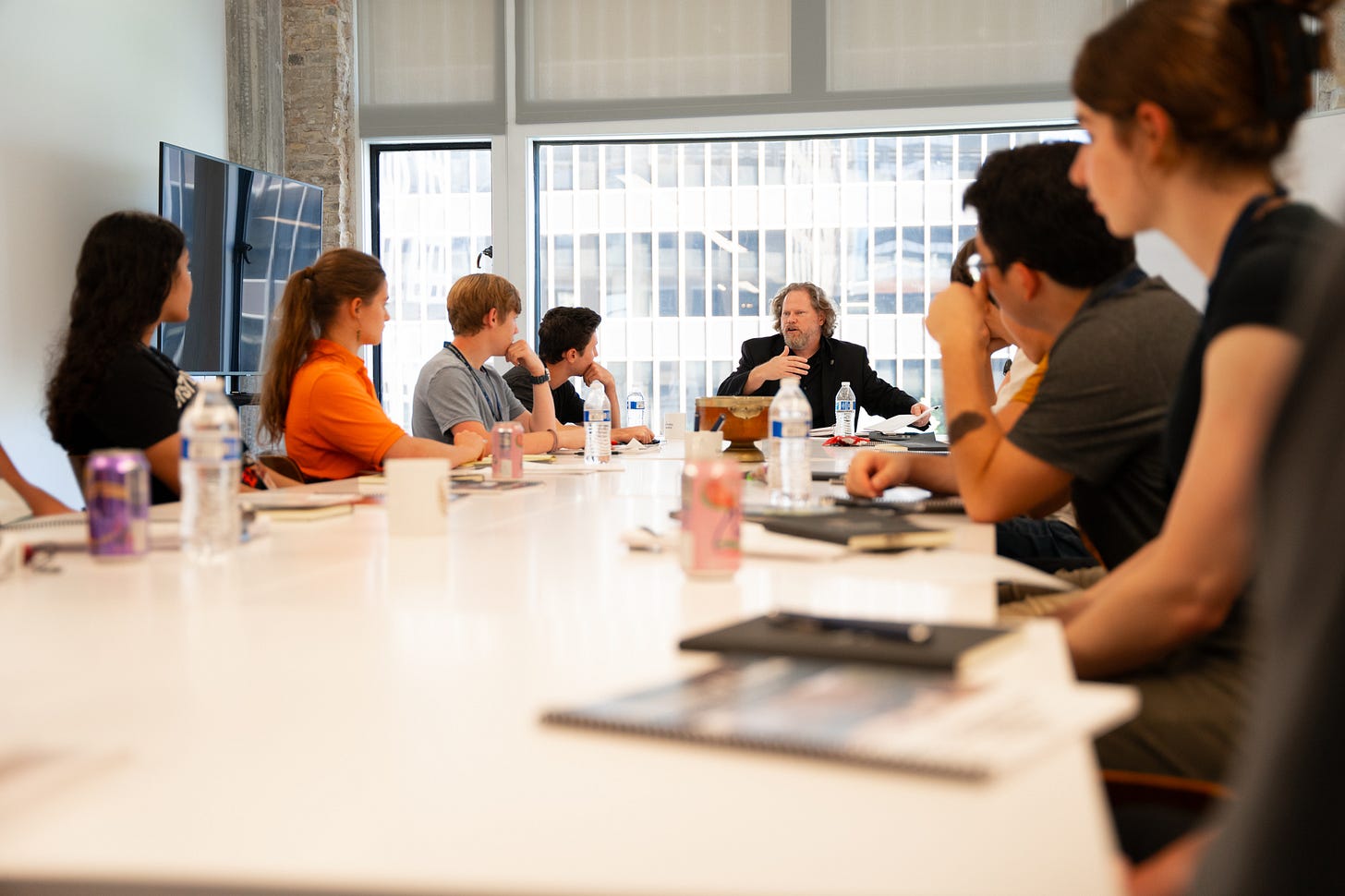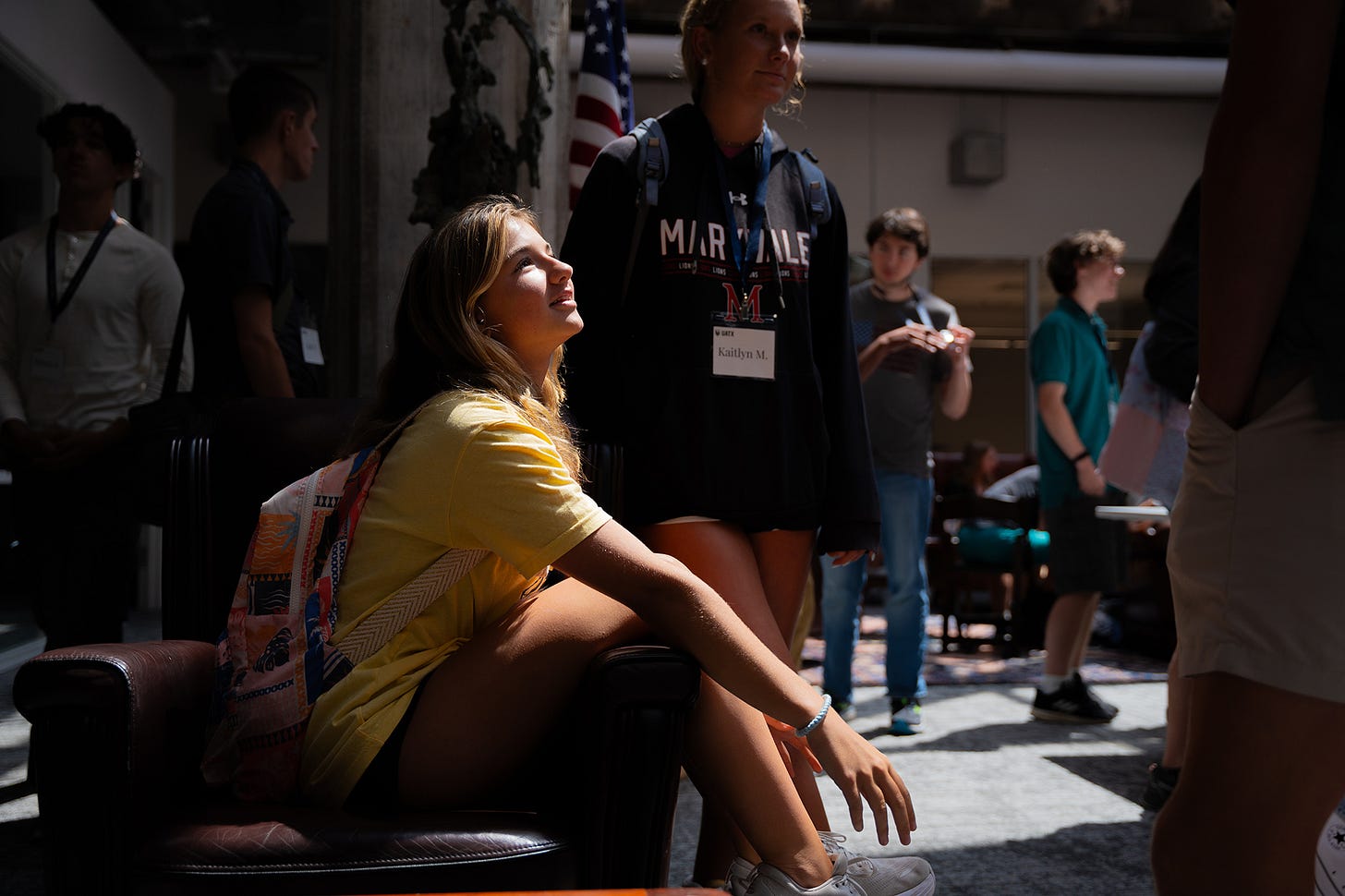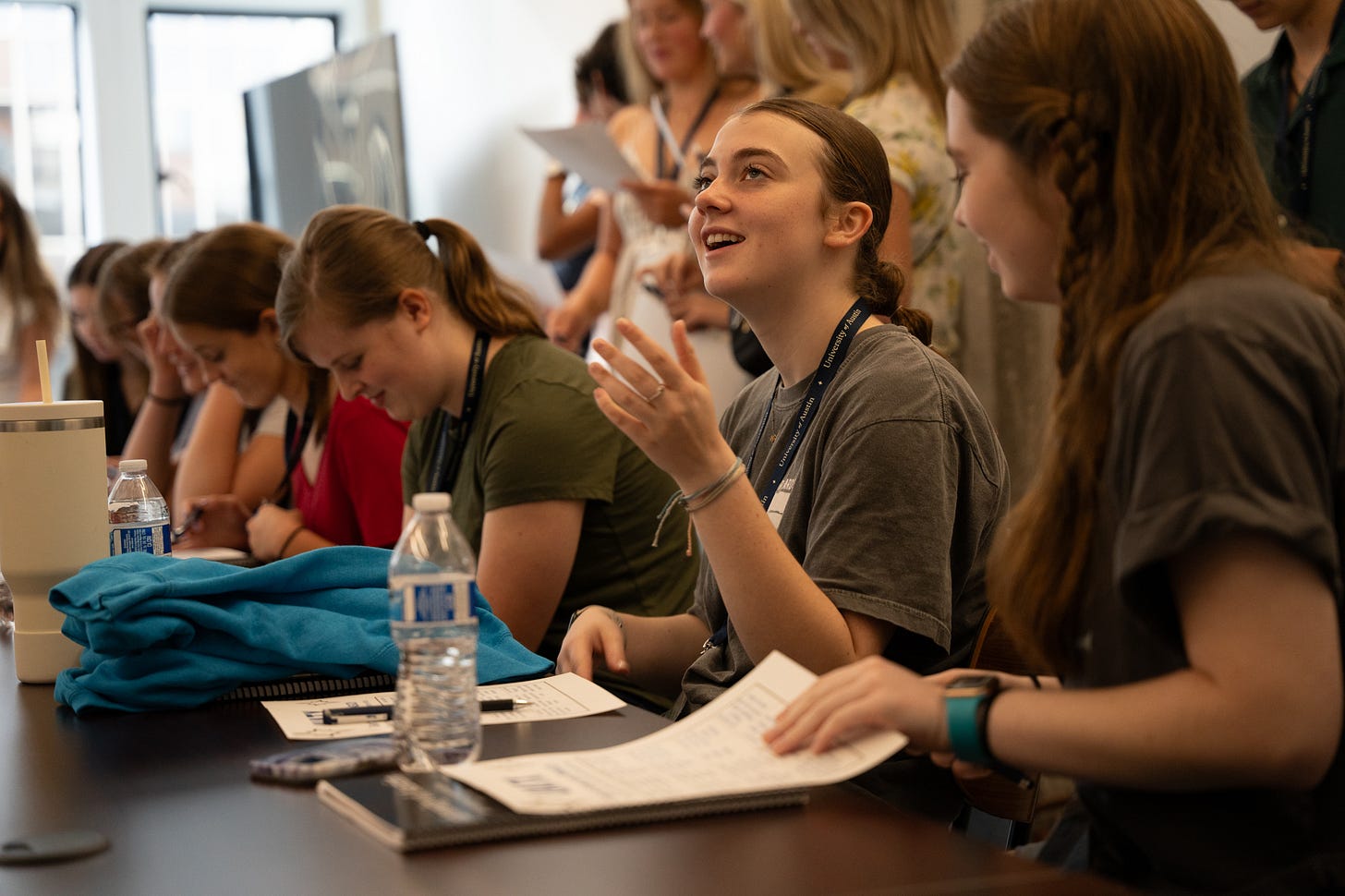Resist Evil by Recognizing It: Notes From a Dean's Summer Seminar
Morgan Marietta leads students in pursuing truth beyond ideology.
Morgan Marietta, UATX Dean of Economics, Politics, and History, wants students to look boldly at dangerous ideas.
Students in his seminar at the University of Austin’s recent high school summer program examined some of the most impactful ideological statements of the last two centuries, including Karl Marx’s “Communist Manifesto,” Joseph Goebbels’ “Knowledge and Propaganda,” and Benito Mussolini’s “The Doctrine of Fascism.”
“This is the time to be studying ideology, and my students were remarkably engaged,” Marietta said. “Perhaps it is because they have pent-up questions and recognize that on our campus, they could speak about taboo subjects. It was energizing for them to hear new perspectives from me and the other students, which is the purpose of attending university.”
Marietta’s seminar, “Ideology: Concept & Clash in Contemporary Politics,” was one of eight taught by University of Austin professors on topics ranging from Shakespeare's Hamlet to game theory and artificial intelligence at UATX's Life of the Mind: Summer Edition, held August 1-3 for over 120 high school students who came from 19 states and five countries.
“Only when we think through the beliefs of others, which may at first be unbelievable, can we see why the fascists thought Americans would join them against the communists, why utopianism leads to violence, or why wokeism embraces anti-semitism,” according to Marietta.
What’s more, “in their high schools, most students had never heard a discussion or explanation of the ideology that brought us 9/11 and many other terrorist attacks,” he said. “Why has such an important thing never been discussed? Because it would frighten the children, and because it would expose the teachers to criticism. But they are not children anymore, and faculty with courage and the protection of their employers can speak of difficult subjects.”
In his view, we study the architects of pernicious ideologies to learn how we might think differently.
“To be wise as serpents and innocent as doves is not a contradiction, but an instruction: avoid evil by knowing what it is,” Marietta said.
Moreover, “it is quite possible for morally reprehensible people to nonetheless be intelligent and have important ideas.”
That means ideas should be judged on their merits, not by the character of those who invented them.
Marietta: We transcend ideology through community rooted in truth
Ideology “is hard to understand when you have one because that ideology shapes your perceptions, especially how you perceive other ideologies,” Marietta said.
Yet, in his seminar, he guided students in rising above that paradox.
The course concluded with the essay "Live Not by Lies" by the Russian Soviet dissident Alexander Solzhenitsyn, which Marietta called “one of the great statements about how to live in an ideological time such as ours, with the great forces of coercion we face.”
Solzhenitsyn’s prescription for transcending deceitful ideology is hard but simple: honesty with oneself first, then honesty with others.
“If we join a community grounded in seeking the truth with integrity, both are possible, though never easy,” Marietta said.
At the concluding reception of Life of the Mind, University of Austin President Pano Kanelos echoed that invitation.
“What the world needs from you right now is your hope,” Kanelos said. “It needs your ability to see through all the static noise and all the ugliness and to focus on human flourishing, on the things that are beautiful, good, and true.”
Often that means looking bravely in the darkest places.
Dean Marietta, the author of A Citizen's Guide to American Ideology: Conservatism and Liberalism in Contemporary Politics, describes the political consequences of our ideological divides:
“If you study how humans really think, their values and ideologies, and their perceptions of reality — which are entirely divided in the current day — then you can understand political conflict, and you can understand the people you run into,” he says.
“And this is not how contemporary social science is organized or taught.”
More from Morgan Marietta:
“Why I Joined UATX” (The American Mind)
“The State of American Democracy” (27 Rouge with Scott Newman)
UATX faculty and staff nominate important works on timely topics.
Alex Priou, UATX Associate Professor of Political Philosophy, recommends Fascism and Communism by Francois Furet and Ernst Nolte to understand the most powerful ideologies of our day:
The volume contains the brief but insightful correspondence between the two historians, whose debate about the origins of Nazism leads to reflections on the interplay between the three dominant ideologies of modernity: liberalism, communism, and fascism. Their letter discusses how these ideologies tend to pair and part depending on the circumstances, thus revealing their deeper commonalities and differences—as well as their tactics. I think it's essential reading for understanding much of our current politics.
Jacob Howland, UATX Provost and Dean of Intellectual Foundations, suggests reading Nadezhda Mandelstam's Hope Against Hope and Yevgeny Zamyatin's We to understand ideology turned tyrannical.
Says Howland:
Nadezhda Mandelstam knew all the major Soviet writers of the 1920s and 1930s, and was the wife of the great poet Osip Mandelstam, who died in the Gulag after criticizing Stalin. Hope Against Hope is a brilliant account of the collapse of intellectual life and the terror and bleakness of everyday existence at the height of ideological tyranny. Of Hope Against Hope and its equally powerful sequel, Hope Abandoned, the poet Joseph Brodsky writes: “[Mandelstam’s] memoirs are something more than a testimony to her times; they are a view of history in the light of conscience and culture. In that light, history winces, and an individual realizes his choice: between seeking that light’s source and committing an anthropological crime against himself.”
The author of We, Yevgeny Zamyatin, was an engineer and a poet who initially supported the Russian Revolution but quickly realized that the Bolshevik regime would crush individual freedom. Written in 1920 and narrated by D-503, the builder of the spaceship Integral, We is a stunning prophecy of technologically-amplified totalitarianism that envisions a future society in which individuals are reduced to interchangeable units. Arguably the greatest dystopian novel of the 20th century, We provided a prototype for Aldous Huxley’s Brave New World, strongly influenced George Orwell’s 1984, and anticipated themes central to Ray Bradbury’s Fahrenheit 451. Readers might enjoy this short article and podcast, which relate We to disturbing trends of the 21st century.
The UATX Life of the Mind: Summer Edition high school summer program brought students to our Scarbrough campus in Austin for academic seminars and workshops on entrepreneurship.
Take a look:
Want to signal your commitment to renewing higher ed? We’ve got you covered with shirts, hats, sweatshirts, and more.
We’re seeking extraordinary individuals to join us in building the University of Austin. View all jobs.
What would you like to see Inside UATX? We want to hear from you. Email us at media@uaustin.org.
See you next Monday!
Maggie Kelly is the editor of Inside UATX. Follow her on X @margaretbkelly.









